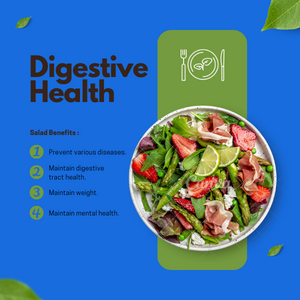DIGESTIVE HEALTH

Your digestive system breaks down food and liquid into their chemical components—carbohydrates, fats, proteins, vitamins, and minerals—so the body can absorb these nutrients, use them for energy, and build or repair cells.
Many organs make up the digestive system. Digestion begins the moment food is chewed and travels from the mouth, down the esophagus, and into the stomach. Once in the stomach, food is mixed with digestive enzymes and then slowly emptied into the small intestine, which further breaks down food, absorbs nutrients, and sends them into the bloodstream.
The remaining watery food residue moves into your large intestine (the colon). As undigested food passes through it, bacteria feed off the remnants. The wall of the large intestine soaks up most of the remaining water.
Other organs also contribute to the digestive process. The liver produces bile, a brownish-yellow liquid that helps to digest fat. Bile is stored until needed in the gallbladder. The pancreas works with the small intestine to produce enzymes needed to help digest proteins, fats, and carbohydrates.
Any undigested food that remains is expelled by a highly efficient disposal system involving the rectum and anus.
Certain foods can help keep your digestion healthy. For instance, foods that contain probiotics (healthful bacteria) can increase the number of good bacteria in your gut microbiota, the 100-plus trillion bacteria that live inside your digestive system. A healthy microbiota can improve immune system functioning, help maintain regular bowel function, and reduce damaging inflammation.
Popular foods that contain probiotics are yogurt and kefir, a yogurt-like drink. (Look for “live and active cultures” on the label.) Other probiotic sources are fermented foods like sauerkraut, miso (a paste made from soybeans), and some pickles. (Look for the words “naturally fermented.”)
Probiotics are supported by prebiotics, which help good bacteria grow and thrive in the digestive tract. Prebiotic are found in beans, whole grains, garlic, bananas, onions, and asparagus.
Adequate fiber is also important for good digestion. Fiber helps to soften and provide bulk to stool, which allows it to pass more easily through the intestines.
There are two types of fiber: insoluble and soluble. Insoluble fiber is found in whole grains, wheat cereals, and vegetables such as carrots, celery, and tomatoes. Soluble fiber sources include barley, oatmeal, beans, nuts, and fruits such as apples, berries, citrus fruits, and pears.
Over-the-counter fiber supplements (capsules, chewable tablets, and powders mixed with water) may be an option for people who have trouble eating enough fiber-rich food.
